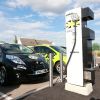Part of the scheduled ban is part of the country's plan to transition to zero-emission vehicles.
The UK government revealed that it is collaborating with the industry to seize the significant opportunities for economic growth and improve living standards for workers.
On Christmas Eve, Transport Secretary Heidi Alexander launched the consultation to gather expert views on fulfilling the manifesto commitment to restore the 2030 phase-out date for new petrol and diesel cars and ensure the success of the transition.
Currently, over two-thirds of UK car manufacturers, including Nissan and Stellantis, have committed to transitioning to electric vehicles by 2030.
According to the Government, this consultation aims to provide clarity for vehicle manufacturers and the charging industry, instilling confidence in their long-term investments in the UK and driving growth in the automotive sector.
This is something that the wider sector has called on in recent months.
The consultation also proposes updates to the Zero Emission Vehicle (ZEV) Mandate, which is a joint responsibility of the UK government, the Northern Ireland Department for Infrastructure, the Scottish Government, and the Welsh Government.
The mandate outlines the percentage of new zero-emission cars and vans that manufacturers will be required to sell each year up to 2030.
As a part of the new plans, the Government is looking to increase the support to manufacturers in making the transition.
The ZEV Mandate will now include several ‘flexibilities’ to help, such as selling fewer zero-emission vehicles than the target if they offset this in other ways. The consultation will assess the design of these flexibilities to ensure they continue to support manufacturers.
The consultation focuses on how to reach the 2030 target, rather than if it is achievable. It will allow the sector to assess how well the current arrangements and flexibilities are working, determine which hybrid cars can be sold alongside zero-emission models from 2030 to 2035, and explore any additional support measures to ensure a successful transition for both the industry and consumers.
The UK automotive sector currently employs over 152,000 people, is the UK's most valuable export, and contributes £19 billion to the economy. Electric vehicles (EVs) are also becoming more affordable to own and operate, with running costs as low as 2p per mile.
Research indicates that switching to an electric vehicle could save consumers up to £750 annually in running costs when charged at home compared to petrol and diesel cars. Upfront costs are also decreasing, with one in three used electric cars now available for under £20,000, according to industry data.
By getting this transition right and fostering the growth of the electric vehicle market, the UK can tap into a multibillion-pound industry, create well-paid jobs for decades, and fulfill its commitment to improving the financial well-being of working families.
Transport Secretary Heidi Alexander said: “Employing 152,000 people and adding £19 billion to our economy, the UK’s automotive industry is a huge asset to our nation — and the transition to electric is an unprecedented opportunity to attract investment, harness British innovation, and deliver growth for generations to come.
“Yet over the last few years, our automotive industry has been stifled by a lack of certainty and direction. This government will change that.
“Drivers are already embracing EVs faster than ever, with one in four new cars sold in November electric. Today’s measures will help us capitalise on the clean energy transition to support thousands of jobs, make the UK a clean energy superpower, and rebuild Britain.”

RAC sale – up to 33% off*
• Roadside cover from £5.29 a month†
• We get to most breakdowns in 60 mins or less
• Our patrols fix 4/5 breakdowns on the spot











